
By:
- Amanda Rubalcava
Published Date
By:
- Amanda Rubalcava
Share This:
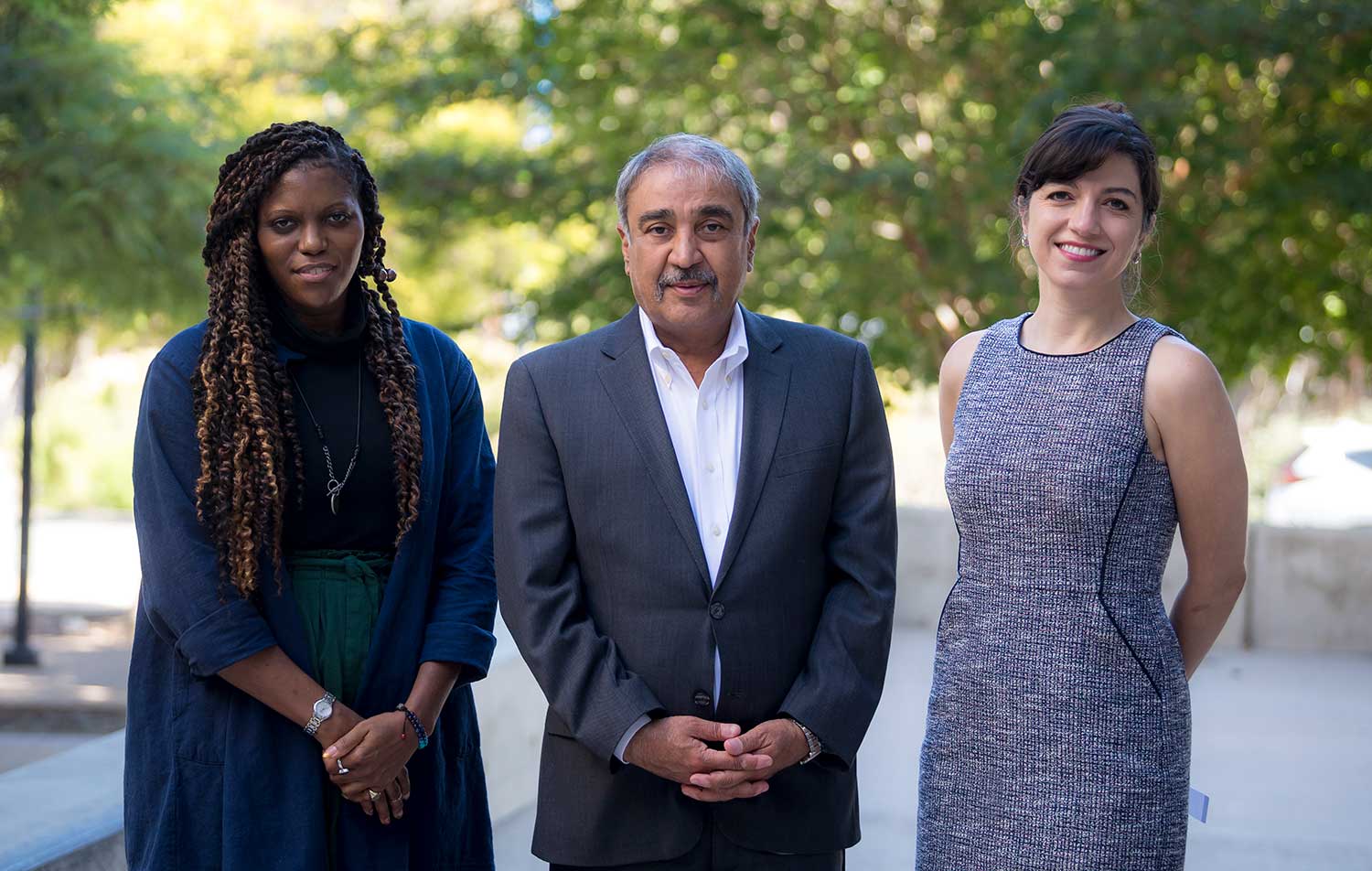
UC San Diego Chancellor Pradeep Khosla honored Campus Privacy Officer Pegah Parsi and structural engineering student Dana Gibson at the 22nd Annual UC San Diego Veterans Staff Association Veteran Recognition Ceremony. Photo by Erik Jepsen/UC San Diego.
UC San Diego Veteran Community Members Celebrated for Their Service
UC San Diego honored veterans and military-affiliated campus community members for their dedication to our country at the 22nd Annual UC San Diego Veterans Staff Association Veteran Recognition Ceremony on Nov. 9. The theme of this year’s celebration was “Finding Meaning in Your Service,” spotlighting the contributions of those who look inward and go above and beyond to positively impact the greater community.
As part of the event, Campus Privacy Officer Pegah Parsi was honored with the UC San Diego Veteran of the Year award and structural engineering student Dana Gibson was honored with the Student Veteran of the Year award. In addition, all veterans and military service members in attendance were recognized for their service and sacrifice to the nation.
Pegah Parsi: UC San Diego Veteran of the Year
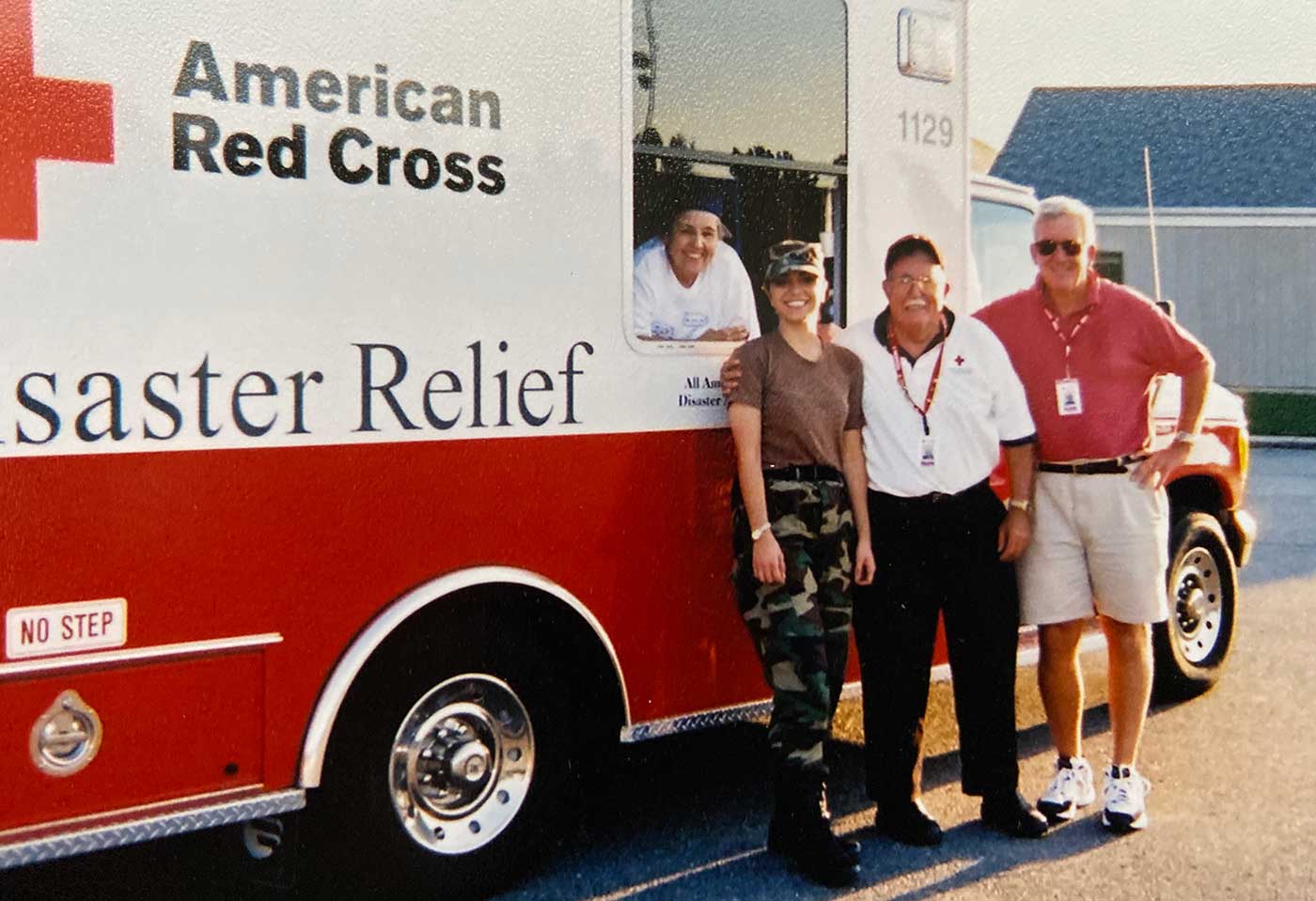
During her service as a member of the Army National Guard, Pegah Parsi worked with the American Red Cross to support disaster relief. Photo courtesy of Pegah Parsi.
This year’s UC San Diego Veteran of the Year recipient, Pegah Parsi, served her country as a member of the Army National Guard. Today, she serves as the inaugural campus privacy officer at UC San Diego where she spearheads the privacy and data protection efforts for the university.
For Parsi, the ceremony’s theme was especially relevant—with the 2021 withdrawal of the United States troops from Afghanistan, she experienced her earned skillset, personal identity and passion for advocating for civil liberties collide in a new meaningful way. Today, armed with expertise for advocating for those with privacy concerns, she recognizes a new sense of ownership of her veteran status where her personal interests intermingle with her current work.
We spoke to Parsi to learn more about her experience in the service and her continued efforts protecting those in most need:
Q. What branch of service did you join and when?
I became an American citizen right when I turned 17, and then a month later, I joined the Army and stayed in the National Guard while I went to college. I was enlisted for a total of six years.
Q. What originally inspired you to join the Army National Guard?
My family and I are from Iran and my childhood years were during the Iran–Iraq War, so you would think that that would make me not want to be in the military. But, coming from a military family, it made me interested in human behavior during wartime. I also wanted the adventure and to learn about other people.
Q. What roles did you serve while in the National Guard?
For the majority of the time, I was a chemical operations specialist. We are the ones that go in during a chemical attack in full gear to decontaminate spaces, or to take measures of radiation. Very early in the Iraq war, because they thought there were weapons of mass destruction (WMDs), my unit was mobilized to go overseas.
However, when they found out there were no WMDs, my unit then became truck drivers—which is kind of funny. I went to truck driving school where I was an honor graduate, and to this day, I do an excellent parallel parking job.
I did many non-glamorous, though very important, jobs. I think for this reason, when I left the service, I lay dormant as a veteran. Being a veteran was not a part of my identity until recently.
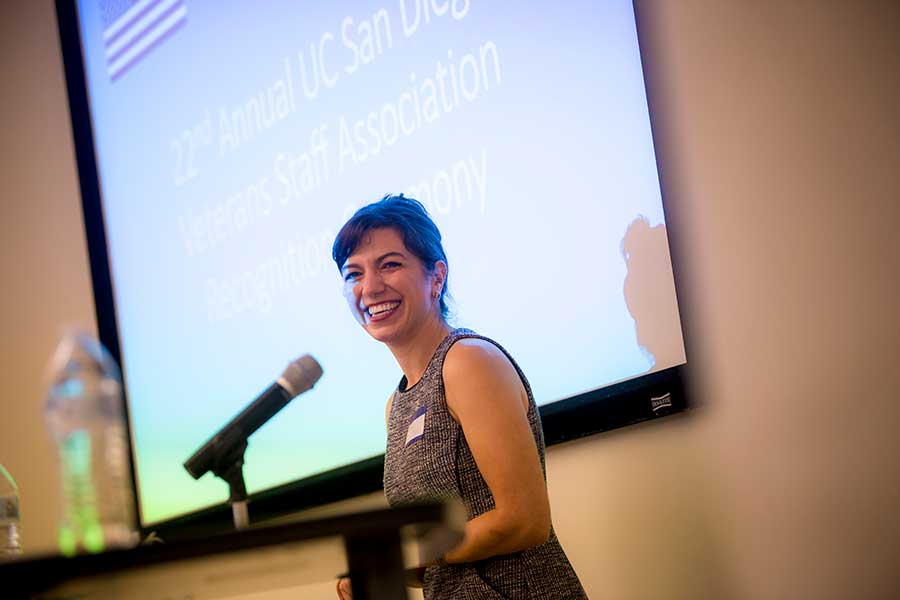
Pegah Parsi speaks to the audience after being recognized with the UC San Diego Veteran of the Year award.
Q. Can you talk about your journey after the Army National Guard and how you arrived at the career you are now?
I was always interested in human nature, and because of having grown up during a war, I was primarily interested in doing human rights, civil rights and civil liberties work.
I went to law and MBA schools right after college and graduated in the middle of the recession. Human rights type of work is notoriously hard to get into it, so I kept working at the University of Maryland and did research and contracts. While this was important and interesting work, it was not my passion. I went on to Stanford to do the same kind of work—research administration, research contracts and grants. Then, at one point, I started seeing privacy and data security terms in contracts I was negotiating.
Very quickly, it became clear to me that privacy and data matters were the next civil liberties issues of our time. To this day, I am very interested in the way that our privacy practices and technology have an impact on our daily lives, on society, on marginalized communities and democracy broadly.
After Stanford, I was recruited to be UC San Diego’s inaugural campus privacy officer. I have spent my time trying to educate the community on the importance of ethics in our data handling and privacy practices.
Q. How did you grow to embrace your veteran status?
I started going to the Veteran Staff Association (VSA) meetings at UC San Diego. They were such a welcoming group of people and they were doing good work. With the VSA, I slowly came to value my veteran status and came to understand that it is very diverse community with lots of voices and different ways of contributing and participating.
Q. Can you share some of your recent work with the VSA?
Last year, when the racial protests started, more of a social dialogue had begun around race, ethnicity and different equity, diversity and inclusion (EDI) issues. I thought that this was a very interesting time to look at military and veteran organizations.
I have spent the last year with the VSA trying to bring military historians to talk about the military and how it has dealt with EDI issues. We are putting together this documentary video and a panel session to talk about what we can learn from the military’s EDI efforts—what they did wrong and what they did right.
Q. How have you recently “found meaning in your service”?
My entire identity and all of the different parts of my life smashed together recently to create this completely understandable thing when the U.S left Afghanistan in August. We left many of our allies and friends—a lot of people that put their blood, sweat, tears and lives on the line for us—behind. When this happened, I think the collective veteran consciousness awakened. Military members and veterans who had spent time in Afghanistan felt this was not right.
Out of this was born #AfghanEvac, a coalition of over a hundred different types of organizations —many of them veteran and service members—who banded together to get people to safety.
The thing that I am helping with is their privacy needs. I help make sure that their databases are secure, for example, and that they are not prone to hacking and have good information hygiene.
I am now doing work that involves human rights, my veteran voice and my privacy knowledge. Everything all of a sudden is in this nice package and it is just so fulfilling.
Dana Gibson: Student Veteran of the Year
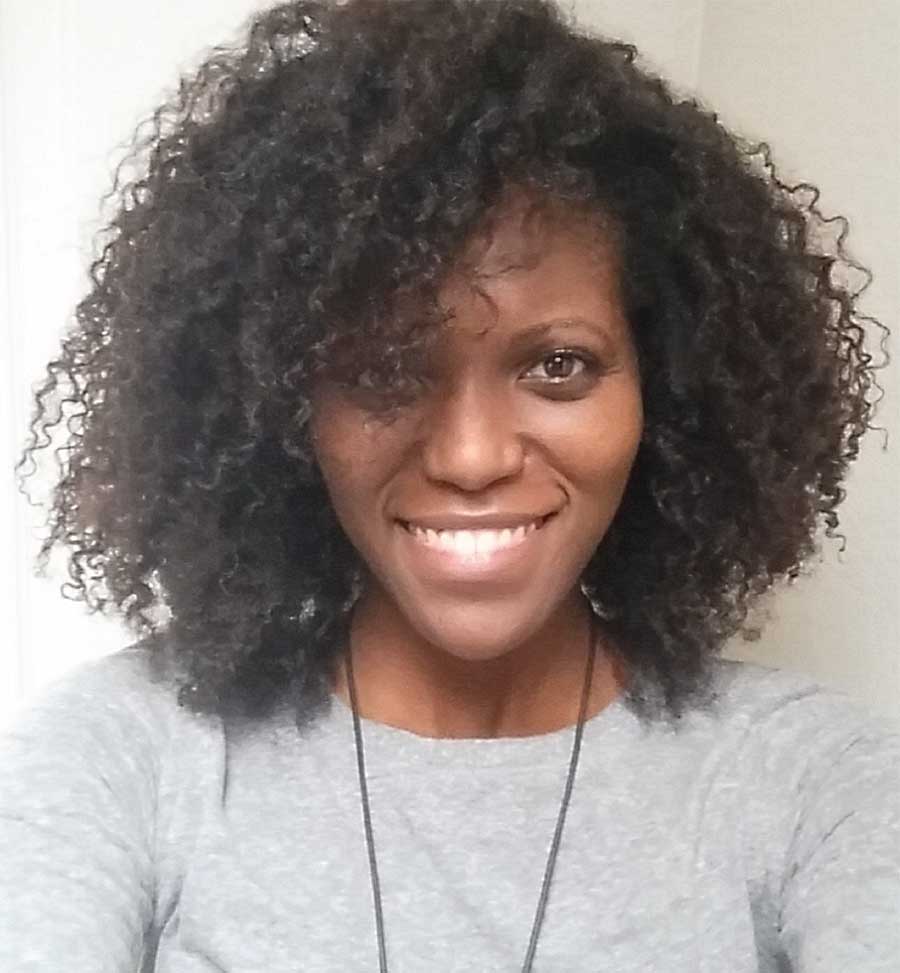
Dana Gibson, U.S. Navy Veteran and structural engineering student. Photo courtesy of Dana Gibson.
For Student Veteran of the Year Dana Gibson, her service in the U.S. Navy helped shape the focus of her future career around sustainability. After graduating from high school, she joined the Navy, training for nuclear power and electrical distribution in South Carolina before being stationed on the USS Ronald Reagan on Coronado.
Q. What was your experience like in the Navy?
The USS Ronald Reagan was the West coast flagship at the time and we continually went on Deployments to the Gulf. It was definitely a unique experience living and working in nuclear power onboard an aircraft carrier. I enjoyed working with the monumental size of all the equipment and complex technology of the systems, and traveling was my favorite part of the experience.
Q. Can you share how being in the service affected your future career goals?
Being an animal lover at a very young age born and raised in East LA, I had already begun to develop a mindset toward environmental and social justice. Then, living and working on a floating city with a community fleet and gaining a first-hand perspective on the way people lived in other countries contributed insight and had a massive impact on my mindset regarding sustainability. So, even though I studied while in service to get my associate degree in nuclear technologies, by the end of my service I already knew I wanted to focus my career on sustainability and modernized self-sufficiency technologies.
Q. What have been your contributions supporting fellow military-connected students on campus and in the community?
I joined the Student Veterans Organization as the Outreach Liaison to network for the UC San Diego student veteran’s community and support personal, professional, and academic success. This connected well with my passion for sustainability research and development.
I became the outreach intern for the UC San Diego student council Office for Environment and Social Justice. Later, I went on to become the Associate Vice President of that same office and worked at the Student Veterans Resource Center (SVRO). During this time, I created Green Corps and further advocated for Sustainability Engineering and was also engaged with the Inter-Sustainability Council.
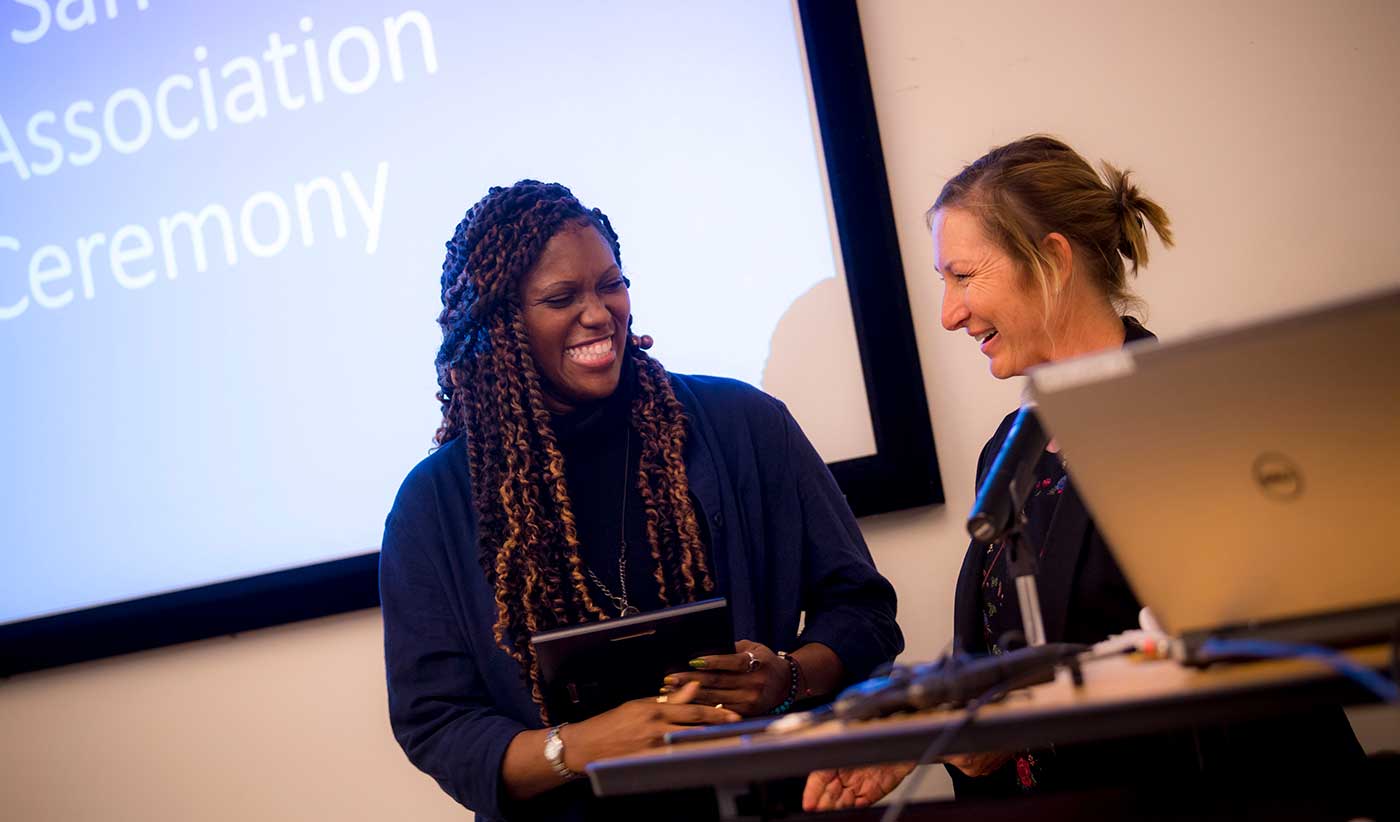
Dana Gibson was recognized with the Student Veteran of the Year award at the annual event.
Q. Can you talk about your work with Green Corps, the student organization you created at UC San Diego?
Green Corps is a SSEO design, analytics, and consulting entity for Holistic Sustainability providing sustainable socio-ecological optimization. It is an organization based on environmental and social justice, aiming to repurpose our economic, social, and food-water-energy-waste systems, and re-envisioning our infrastructure to create sustainable solutions to everyday problems and bring solidarity to all people.
Q. How does it feel to be awarded Student Veteran of the Year?
I’m extremely grateful for this recognition of my passion for environmental and social justice. I want to empower and mobilize people with environmental innovation and technology through the Green Corps framework for professional development by developing hands-on training in collaboration with industry professionals.
My passion continues to expand and blossom with sustainability technology, arts and design. My company, ESJ Design Arts, is a company that produces art representing Black women of color and naturally curly/coiled hair with the beauty of animated realism.
Q. Can you talk about the military community at UC San Diego?
The military community at UC San Diego is an invaluable support resource for student veterans and the university as a whole. Both the university and its military community exchange diverse insights and provide an intrinsic layer of community connecting the military, scholastic, and political cultures that are the basis of our government infrastructure.
Share This:
You May Also Like
Stay in the Know
Keep up with all the latest from UC San Diego. Subscribe to the newsletter today.


